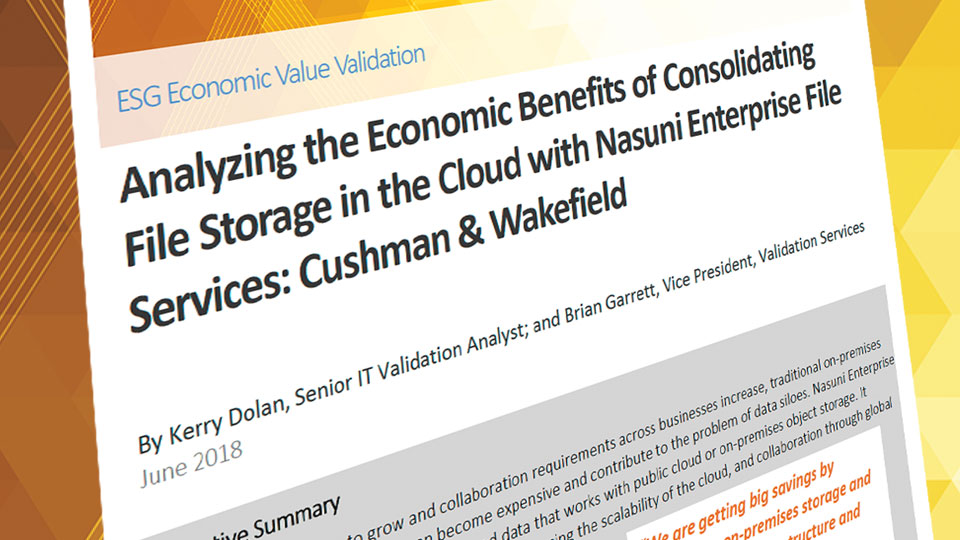Global Real Estate Powerhouse Saves Time and Money with Cloud File Services
Independent analyst finds a global real estate firm using Nasuni and Azure to store and protect file data is reaping big rewards.
July 25, 2018


When Cushman & Wakefield merged with DTZ to become the world’s second largest commercial real estate company, the IT organization found itself with over 400 locations and 45,000 employees to support. Achieving economies of scale for the combined entity quickly became a top priority, and modernizing the firm’s global file infrastructure a key area of focus.
Nasuni Cloud File Services and Azure object storage were selected to transform the way Cushman & Wakefield stores, protects, and manages unstructured file data across all its offices.
But cloud transformation also needs to show real cost savings. So top management agreed to allow independent storage consulting firm Enterprise Strategy Group (ESG) to audit how consolidating file servers and eliminating traditional file backup and disaster recovery infrastructure is saving the firm time and money.
Results of Deploying Nasuni Cloud File Services and Azure Object Storage
ESG interviewed a number Cushman & Wakefield IT managers following completion of the Nasuni-Azure Phase 1 rollout in Europe. Here is a sampling of the results ESG documented in its Economic Value Audit (EVA) report.
“We are getting big savings by eliminating on-premises storage and data protection infrastructure and simplifying management.”
–Global Technology Solutions Manager, Cushman & Wakefield
- Adding capacity is so much easier – IT was spending 5-6 hours a week per office dealing with capacity requests, a problem compounded by different legacy storage solutions at each office. With Nasuni and its edge appliances – capacity can be added to any office with the touch of a button, and local access is fast and efficient.
- No more refreshes – The rollout is eliminating the need to refresh or add full-sized file servers, while also reducing the costs of networking, floor space, power, and cooling.
- No more backups – The company is eliminating on-premises backup servers and software, tape media, and tape vaulting.
- Better end user service – Fast, easy restores-offices are eliminating restore from tape, which often took several days, and replacing that with fast, granular restore from the cloud. Restore takes just a few clicks instead of hours to days with tape, and Nasuni offers a user self-service option. Business continuity has increased with files a lot more highly available.
“Users are impressed by the frequency of Nasuni versioning – we can restore to the very point in time when they accidentally deleted a file.”
- No more complex drive mappings –Cushman & Wakefield can now eliminate complex driving mappings that were required to accommodate users accessing data from multiple offices. Instead, all data resides on a central volume, globally accessible from any location.
- Fast local file access and multi-site synchronization – With Nasuni, data is available from anywhere, with recently used data cached on the local edge appliances for optimal performance.
With Phase 1 complete and delivering quantifiable value, Cushman & Wakefield is now executing its Phase 2 rollout of Nasuni and Azure for its offices in North America.
“Our biggest savings are on storage costs, and getting rid of backup storage and software.”
Want more details about the cost savings and other benefits the global real estate powerhouse is realizing with the combination of Nasuni and Azure? Your copy of the ESG EVA report is available here: Analyzing the Economic Benefits of Consolidating File Storage in the Cloud with Nasuni Cloud File Services: Cushman & Wakefield
[rev_slider alias=”esg-cushman”]